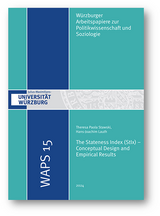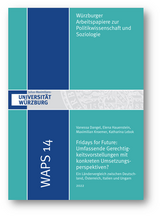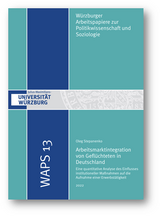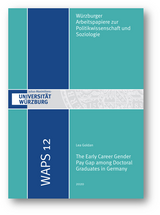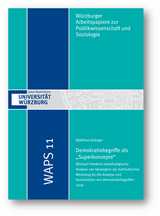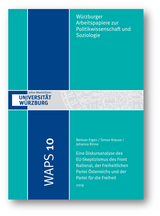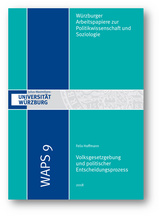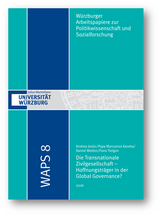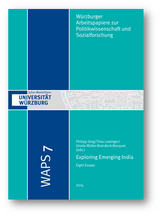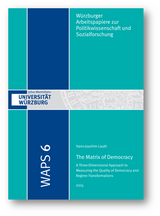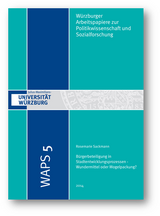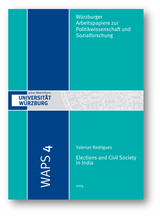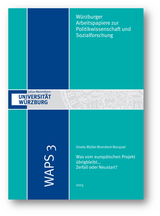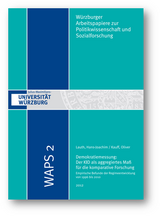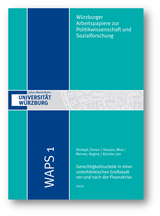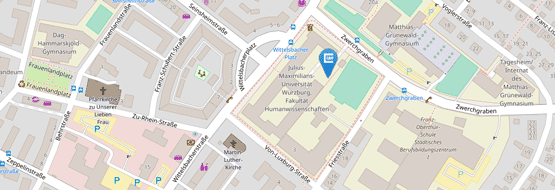Würzburg Working Papers in Political Science and Sociology
The Stateness Index (StIx) – Conceptual Design and Empirical Results
Theresa Paola Stawski / Hans-Joachim Lauth
WAPS 15
Published: 10 January 2024
Language: English
DOI: 10.25972/OPUS-34761
Exploring and explaining diversity and patterns of stateness is crucial for understanding causes of efficiency, duration, or the collapse of a state. The new Stateness Index (StIx) contributes to the conceptual and analytical debate on stateness and state fragility. StIx is a tool for measuring stateness and state quality since 1950 that includes country-ranking through aggregated and disaggregated data to advance performance comparison and policy analysis. This article first sums up the main theoretical aspects, followed by descriptive results.
Fridays for Future: A comprehensive idea of justice with concrete implementation perspectives? A country comparison between Germany, Austria, Italy, and Hungary
Vanessa Dangel / Elena Hauenstein / Maximilian Kroemer / Katharina Lebok
WAPS 14
Published: 8 December 2022
Language: German
DOI: 10.25972/OPUS-29637
German Title: Fridays for Future: Umfassende Gerechtigkeitsvorstellungen mit konkreten Umsetzungsperspektiven? Ein Ländervergleich zwischen Deutschland, Österreich, Italien und Ungarn
The relevance of the social movement Fridays for Future (FFF) remains high even after the Covid-19-pandemic. Many demonstrators worldwide took to the streets on 23 September 2022 in the global climate strike for climate justice. The great popularity of the movement raises the question of what the climate movement understands by justice and how it wants to implement it politically. For the study, a country comparison is made between the FFF-groups Germany, Austria, Italy and Hungary. This article carried out case analyses using interviews with activists, analyses of the websites and the most relevant social media channel. The research concludes that the groups’ ideas of justice are almost identical. Regarding the implementation perspectives there are many similarities in the networking and agenda setting of the national FFF-groups. While the activists’ concrete demands to different actors diverge, all four FFF-groups studied have in common that politics is the central target group of their demands.
Labor Market Integration of Refugees in Germany – A Quantitative Analysis of the Influence of Institutional Measures on the Admission to Employment
Oleg Stepanenko
WAPS 13
Published: 10 February 2022
Language: German
DOI: 10.25972/OPUS-25535
German Title: Arbeitsmarktintegration von Geflüchteten in Deutschland – Eine quantitative Analyse des Einflusses institutioneller Maßnahmen auf die Aufnahme einer Erwerbstätigkeit
This paper provides an overview of the effects of labor market-centered integration measures on the labor market integration of refugees in Germany, which have hardly been evaluated so far. For this purpose, a secondary data analysis based on the first three waves of the IAB-BAMF-SOEP survey of refugees is conducted, with theoretical foundations in neoclassical (human capital theory and signaling theory) and institutional (actor-centered institutionalism) approaches. The methodological basis of the study is a fixed-effects logit regression, which ensures precise within-estimates of causal relationships by controlling for unobserved heterogeneity. The work shows that both the perception of the labor market-centered counseling offer (labor market counseling of the BA) and the participation in the job-related language support course (ESF-BAMF course) have a causally positive effect on labor market integration. The analyses also show that the impact evaluation of practice-oriented integration measures (PerF, PerjuF, PerF-W and KompAS) should be postponed due to insufficient data. Despite this and overall, two highly effective labor market-centered measures were identified in the Federal Republic of Germany, which provide refugees with a solid basis for integration into the labor market and thus also into the host society. Increased use of these measures and targeted support would appear to be worth striving for, especially in view of the many advantages of successful integration.
The Early Career Gender Pay Gap among Doctoral Graduates in Germany
Lea Goldan
![]()
WAPS 12
Published: 12 November 2020
Language: English
DOI: 10.25972/OPUS-21634
Previous research has shown that female doctoral graduates earn less than male doctoral graduates; how-ever, the determinants of this gender pay gap remain largely unexplored. Therefore, this paper investigates the determinants of the early career gender pay gap among doctoral graduates in Germany. By relying on effects on the supply and demand sides and feedback between them, I theoretically derive determinants of the gender pay gap that comprise doctoral and occupational characteristics. Using data from a representative German panel study of the 2014 doctoral graduation cohort, I analyse the gender pay gap two years after graduation. I apply linear regression on the logarithmic gross monthly earnings and Oaxaca-Blinder de-composition to examine the explanatory contribution of the determinants to the gender pay gap. The anal-yses reveal that female graduates earn 27.2 % less than male graduates two years after graduation. Male graduates being paid a premium outside academia partly drives this gender pay gap. The considered deter-minants largely explain the overall gender pay gap, the most important determinants being working hours, doctoral subject, industry, professional experience gained after graduation, company size, and academic employment. The results offer new insights on the determinants of the early career gender pay gap among doctoral graduates and thereby shed light on one dimension of gender inequalities in post-doctoral careers.
Notions of Democracy as „Superconcepts“: Michael Freeden’s Morphological Analysis of Ideologies as a Methodological Tool for Analyzing and Constructing Notions of Democracy
Matthias Gsänger
WAPS 11
Published: 2 July 2019
Language: German
DOI: 10.25972/OPUS-18335
German Title: Demokratiebegriffe als „Superkonzepte“: Michael Freedens morphologische Analyse von Ideologien als methodisches Werkzeug für die Analyse und Konstruktion von Demokratiebegriffen
In this article. Matthias Gsänger submits the proposal to use the instruments that Michael Freeden developed for the analysis of ideologies, understood as artifacts of political thought, also for the reconstruction and construction of notions of democracy. Freeden designed a three level model for the analysis of ideologies. According to that, ideologies consist of “concepts”, “components” of which the concepts are composed of and the concept’s “configurations”, that define in their interrelation the concrete contents of the very ideology. The semantic contents of the concepts is derived from the empirically observable use of the respective concept. The objective is to avoid conceptual stretching of the concepts. Subsequently the possibilities of analysis provided by the approach are introduced. Freeden denominates “democracy” as a “superconcept” compound of several distinct concepts, analogue to ideologies.
Following this idea, the instruments are transferred to the reconstruction of notions of democracy. It appears, that normative elements have to be considered more explicitly than Freeden suggests, if notions of democracy shall be protected against conceptual stretching and usurpation. The approach also renders possible the construction of notions of democracy in context of political theory. Vital thesis here is the assumption of general application orientation of all notions of democracy. Considering the question related to “universality” of notions of democracy the case is made, that universality concerning notions of democracy as superconcepts appears as neither possible nor desirable. Universalization is rather to be looked for at the level of concepts and their components.
A Discourse Analysis of the EU-Scepticism of the National Front, the Austrian Freedom Party and the Party for Freedom
Berivan Ergen / Simon Krause / Johanna Rinne
WAPS 10
Published: 23 May 2019
Language: German
DOI: 10.25972/OPUS-18091
German Title: Eine Diskursanalyse des EU-Skeptizismus des Front National, der Freiheitlichen Partei Österreichs und der Partei für die Freiheit
After years of progressive European integration marked by the permissive consensus, the rise of right-wing populist parties has put the opposition towards the European Union at the center of scientific debate. Instead of referring to the widely used but vague term of Euroscepticism, this paper summarizes the rejection of the European integration project under the more precise term of EU-scepticism. EU-scepticism reflects the three core elements of right-wing populism: populism, nativism and authoritarianism. By conducting a discourse analysis, the characteristics of EU-scepticism of the Front National (FN, France), the Austrian Freedom Party (FPÖ) and the Party for Freedom (PVV, Netherlands) will be examined for the period from 2010 to the beginning of 2018.
To classify and compare EU-scepticism of right-wing populist parties, a list of criteria has been developed, which can be used for further research. The results show that EU-scepticism is not only ideologically but also strategically motivated. The prospect of government responsibility or government participation weakens existing EU-scepticism. While the latter applies to the FPÖ, the PVV and FN are characterized by a consistently hard EU-scepticism (based on the distinction between the hard and soft categories established by Taggart u. Szczerbiak 2008). Although hard EU-scepticism could weaken as a result of the complicated Brexit negotiations, soft EU-scepticism will remain a key theme of right-wing parties – even after the exit of the United Kingdom.
Full-Scale Citizens’ Initiatives and the Policy-Making Process
Felix Hoffmann
WAPS 9
Published: 18 May 2018
Language: German
DOI: 10.25972/OPUS-16191
German Title: Volksgesetzgebung und politischer Entscheidungsprozess
Since the 1990s the relevance of direct democratic instruments on the regional and municipal level of the federal republic of Germany increased. There has been a successively institutional opening of full-scale citizens‘ initiatives, that resulted in a continuous growing use of this form of political participation. The designs of full-scale citizens‘ initiatives are widely divergent, which made institutional matters one of the priory objects of the comparative research on direct democracy. But there is still a lack of information on the effects of citizens‘ initiatives on the policy-making process. This Paper contributes to this circumstance with a research on the effects of full-scale citizens’ initiatives on the policy-making process in the regional states Brandenburg and Schleswig-Holstein. Therefor I develop an analytical framework, based on conceptual modelling, to examine policy-effects and the mode of the political decision-making. These dimensions will be linked to the direction of impact (agenda-setting/veto) to verify a processual determination of policyeffects and a substantial determination of the mode of the political decision-making.
Transnational Civil Society
A Bearer of Hope in Global Governance?
Andrea Jonjic / Papy Manzanza Kazeka / Daniel Metten / Flora Tietgen
WAPS 8
Published: 4 April 2016
Language: German
DOI: 10.25972/OPUS-13076
German Title: Die Transnationale Zivilgesellschaft. Hoffnungsträger in der Global Governance?
In the light of worldwide crises and conflicts, stronger involvement of transnational civil society is more necessary than ever before. Its engagement for more democracy, transparency and equity has awarded the transnational civil society to the status of a bearer of hope within global governance – especially in the 1990s when non-governmental actors got into the focus of research. Facing the global challenges at the turn of the millennium, the nation state came back to center stage and the question has to be raised whether the actors of transnational civil society still are a bearer of hope to cope with the global crises. This article argues that in spite of significant deficiencies like the lack of legitimacy, complex dependencies and the disparity within the north-south divide, transnational civil society still is playing an essential role within global governance. It leads to more efficiency in governance structures, promotes democratic processes, creates more transparency in international negotiations and contributes to a fairer world – transnational civil society thus still is a bearer of hope in the global concert of power.
Exploring Emerging India – Eight Essays
Philipp Gieg / Timo Lowinger / Gisela Müller-Brandeck-Bocquet (eds.)
WAPS 7
Published: 12 October 2015
Language: English
DOI: 10.25972/OPUS-11997
India's economic rise since the 1990s has been followed by a more prominent global role for the country. Despite economic setbacks in recent years and huge domestic challenges like poverty, caste issues, and gender inequality, India today is almost universally characterised as an “emerging power”. At the same time, the country continues to show an enormous diversity. Thus, exploring emerging India can surely not be confined to economic analysis only. Instead, it is vital to take current developments in domestic and international politics, society, culture, religion, and political thinking into consideration as well.
Following an interdisciplinary approach, contributions from Political Science, International Relations, Indology, Political Theory, and Economics are fundamental in order to grasp the country's diversity. This collection assembles eight essays which, individually, serve as working papers reflecting the authors' various research focuses, while collectively composing a multifaceted and multidis-ciplinary picture of emerging India. It thereby reflects the approach the University of Würzburg’s Centre for Modern India and the Institute for Political Science and Sociology’s India Forum are committed to: bringing together different academic disciplines in order to generate nuanced insights into India’s manifold diversity.
The Matrix of Democracy: A Three-Dimensional Approach to Measuring the Quality of Democracy and Regime Transformations
Hans-Joachim Lauth
WAPS 6
Published: 19 February 2015
Langauge: English
DOI: 10.25972/OPUS-10966
The article presents a proposal for the assessment of the quality of democracy. After elaborating on the methodological strategy, a definition of democracy is proposed, which entails the construction of the matrix of democracy based on three dimensions (political freedom, political equality, and political and judicial control) and five institutions. The methodological application of this measuring tool is then explained. This conception guarantees an appropriate measurement in different cultural contexts, enables the characterization of democratic profiles, and allows for the identification of deficiencies in democracies. Before the conclusion, three examples of the measurement (USA, Russia, and Italy) illustrate how the matrix works.
Civic Participation – Miracle Cure or Bluff Package?
Rosemarie Sackmann
WAPS 5
Published: 17 December 2014
Language: German
DOI: 10.25972/OPUS-10718
German Title: Bürgerbeteiligung in Stadtentwicklungsprozessen – Wundermittel oder Mogelpackung?
Civic participation, especially at the municipal level, has gained prominence during the last decade. Debates about trust and the importance of the civil society for the flourishing of societies in the early 1990s can be regarded as starting point for conceptual developments. Through the intermingling of those early debates with the concept of New Public management the meaning of civic participation has become blurred. Against these developments the paper argues that civic participation has to be understood as a communicative concept; thus, perceptions and interpretations of our social surrounding play a key role in participation processes. Civic participation – as understood in this paper – is related to a concept of governance which highlights the diversity of actors in societal development and to deliberative concepts of democracy.
Elections and Civil Society in India
Valerian Rodrigues
WAPS 4
Published: 30 October 2014
Language: English
DOI: 10.25972/OPUS-10500
The analysis of the 2014 elections to Lok Sabha in India describes the results and their enormous extent with a differentiate regard to social group voting. Considering the election campaign’s performativity and issues of contestation the landslide victory of BJP (Bharatiya Janata Party) will be illuminated. Through a closer examination of party coalitions, the electoral system, and the leadership factor the BJP’s clear victory over Congress Party will be explained. Besides the opportunity for significant economic and political reforms, the author conjectures a potential for dangerous tendencies to Indian democracy owing to such a resourceful government, which are compared with the government constraints, especially by federal arrangements. The second part of the article argues that civil society in India is composed of several layers that are distinct and overlap at the same time.
Five versions of the same are significant: 1) institutions avowing secular nationalism that upholds inclusive citizenship, equality of treatment, and non-discrimination; 2) a phalanx of institutions inspired by the Gandhian idea of swaraj that are deeply vary of the state and its apparatus and envisage a life of freedom constituted around self-determining associations built from below; 3) such orientations and impulses which stress on religiously inspired values and traditions with its archetypal representation in Hindu nationalism; 4) those who highlight difference and diversity as central to Indian society and stress this fact as foundational to Indian nationalism; 5) and those who are in favour of a right-based approach to citizenship and rule of law in India. Alluding to these distinctive domains constitutive of civil society in India the paper argues that the success of the Bharatiya Janata Party, and the coalition that it led, in the General elections of 2014 rested on its ability in tapping resources from different layers of civil society while making institutions woven around Hindu identity as its anchor.
What Will Remain of the European Project – Disintegration or Re-Start?
Gisela Müller-Brandeck-Bocquet
WAPS 3
Published: 28 October 2013
Language: German
DOI: 10.25972/OPUS-1482
German Title: Was vom europäischen Projekt übrigbleibt... Zerfall oder Neustart?
At present, the European Union is suffering from an extremely severe crisis; one can no longer categorically preclude a failure of the European project which up to now has consisted in a constantly advancing process of deepening and widening of the integration community. Apparently, the EU and the Euro Zone are drifting apart. This paper will argue that the numerous and far reaching provisions undertaken so far to rescue the Euro will substantially strengthen the Euro Zone. This piece will equally address the specific role Germany has been playing within the ungoing reform process. Regarding the future, the question arises whether a “Euro Zone core Europe” is to emerge which could secure the sustainability of the unification pro-cess. Presumably, a re-start in the framework of a “Euro Zone core Europe” would confront the EU of the 28+ Member States with a serious threat of disintegration engendering especially dramatic implications for the so called Pre Ins. Such a re-start, however, might provide the integration project with the sole prospects of survival – in any case it presents a challenge of Herculean dimensions.
Measurement of Democracy: The Combined Index of Democracy (CID) as an aggregated measurement for Comparative Research. Empirical Findings of Regime Formation between 1996 and 2010
Hans-Joachim Lauth / Oliver Kauff
WAPS 2
Published: 25 September 2012
Language: German
DOI: 10.25972/OPUS-6174
German Title: Demokratiemessung: Der KID als aggregiertes Maß für die komparative Forschung. Empirische Befunde der Regimeentwicklung von 1996 bis 2010
The Combined Index of Democracy (CID) measures the quality of regimes in 161 states between 1996 and 2010. Our two meta-indices – the CID3D (Combined Index of Democracy 3 dimensions) and the CID – result from combining data from Freedom House, Polity and the Governance Indicators collected by the World Bank in order to overcome shortcomings of those indices. First we will discuss different existing approaches of measuring democracy and then introduce our own propositions – CID3D and CID. The CID3D is based on a three di-mensional concept of democracy including the dimensions freedom, equality, political and judicial control. The data of the dimensions ‘freedom’ and ‘equality’ are derived from Freedoms House’s Political Rights Rating and Polity’s DEMOC indicator. The data of the third dimension is based on the ‘rule of law’ index of the World Bank’s Governance Indicators. It encloses control and thereby aspects of horizontal accountability and rule of law. The CID also includes stateness as an additional factor. Freedom House, Polity and the Governance Indicators of ‘rule of law’ fall short in providing adequate indicators for this factor. The Word Bank’s Governance dataset furnishes information about an effec-tive state monopoly on the use of force with the ‘political stability’ indicator. CID3D and CID scores can range from a scale of 0 to 10. The lowest score describes an intensely autocratic regime, the highest score relates to a full democratic system. CID3D scores of six and eight and the CID scores of five and seven mark thresholds for defective respectively functioning democracies.
In the second part of our paper we present empirical results: In which direction have regimes developed between 1996 and 2010? We discuss regime changes as well as altera-tion regarding the quality of democracy. What trends can be observed in different world regions and is there any regression of democracy? The third part of the paper will undertake an external validity check comparing scores with those of corruption development. We also test CID3D and CID compliance with other democracy indices and discuss deviate results. CID’s complete data is provided in the appendix and online.
Justice Evaluations in a Lower Franconian City before and after the Financial Crisis
Simon Dickopf / Mira Hassan / Jan Künzler / Regina Renner
WAPS 1
Published: 16 February 2012
Language: German
DOI: 10.25972/OPUS-5585
German Title: Gerechtigkeitsurteile in einer unterfränkischen Großstadt vor und nach der Finanzkrise
With the emergence of empirical justice research within the past thirty years a new scientific subject has been established which tries to analyse justice philosophies and ideologies as well as justice evaluations. First, we want to give a methodological input to the operationalization of justice evaluations by suggesting a new measure for evaluating distributive results. A standard instrument wellk-nown from several ISSP- and ISJP-surveys is a battery of items including nine different occu-pational titles asking for actual and just income estimations for every single one. Justice evaluations should depend on values, on individual justice ideologies but also on the individual’s position within social hierarchy.
We secondarily research the question how the international finance crisis 2008/09 has influenced justice evaluations regarding income dis-tribution: Did the crisis lead to demands for levelling income distribution? Or do we in fact observe a polarisation of justice: Did the crisis determine justice evaluations in different ways depending on the individual’s social position? We examine these questions with data collected by the Wuerzburg-Barometer from 2008 and 2009 (random sample, N = 760) in hierarchical OLS-regression models. Our redistribution-index ri shows if there are any deviations from the just state. The direction of possibly demanded redistribution (income differentiation versus income levelling) can as well be measured as the amount of those demanded redistributions by using ri. This ri creates a relation between the estimated variation of actual and just incomes over the given occupa-tional titles and presents the result as a relative percentaged difference between the actual and just state.


